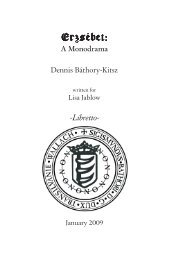Bolder Sounds 20 years of creative sample libraries - Báthory Erzsébet
Bolder Sounds 20 years of creative sample libraries - Báthory Erzsébet
Bolder Sounds 20 years of creative sample libraries - Báthory Erzsébet
You also want an ePaper? Increase the reach of your titles
YUMPU automatically turns print PDFs into web optimized ePapers that Google loves.
Lisa Jablow holds a D.M.A. in Choral<br />
Conducting from the University <strong>of</strong><br />
Wisconsin-Madison, with additional study in<br />
conducting and voice at the Aspen School <strong>of</strong><br />
Music, Tanglewood Festival, Westminster<br />
Choir College, Carnegie Hall Conductors’<br />
Workshops and Conductors Retreat at<br />
Medomak under the likes <strong>of</strong> Pierre Boulez,<br />
Robert Shaw, Joseph Flummerfelt and<br />
Kenneth Kiesler. As a vocal soloist she has<br />
appeared onstage with such organizations as New York City Opera,<br />
Opera Orchestra <strong>of</strong> New York, Milwaukee Symphony, Boise Opera and<br />
Skylight Opera. She has recently performed Carlisle Floyd’s monodrama<br />
Flower and Hawk with WordStage Vermont, Richard Strauss’s Four Last<br />
Songs with the Vermont Philharmonic, and DeFalla’s El Amor Brujo and<br />
Poulenc’s La voix humaine with the Windham Orchestra.<br />
Dr. Jablow is also active as a conductor. She has been the music director <strong>of</strong> the<br />
Montpelier Chamber Orchestra and has guest-conducted numerous other<br />
groups. She has also served as Assistant Conductor for productions at Opera<br />
Illinois and the Green Mountain Opera Festival and is the former Assistant<br />
Conductor and Chorus Director <strong>of</strong> the Pioneer Valley Symphony in western<br />
Massachusetts. Her current positions include Assistant Conductor and Chorus<br />
Director <strong>of</strong> the Vermont Philharmonic Orchestra and Music Director <strong>of</strong> the<br />
Vermont Symphonic Winds.<br />
Ann Harvey is a Duxbury native whose wideranging<br />
career in music and theater spans classical<br />
choral singing to playing Patsy Cline in the soldout<br />
run <strong>of</strong> Always,… Patsy Cline at the Skinner<br />
Barn in Waitsfield. She has worked as a performer,<br />
director, producer and teacher from Michigan to<br />
New York and Vermont to Florida. Ann enjoyed a<br />
long association with Lost Nation Theater as the<br />
director <strong>of</strong> and performer in many <strong>of</strong> the Fall<br />
Foliage Shakespeare productions. While living in New York City, Ann was<br />
Also about the same time, Vermont pianist<br />
Michael Arnowitt was working on a recording<br />
<strong>of</strong> dance music, asking composers to write new<br />
pieces. The composition Dennis created was a<br />
csárdás, a Hungarian dance he named a wild &<br />
crazy csárdás, Meggondolatlan Õrült Iramban<br />
Csárdás, his broken Hungarian name for what<br />
would ultimately become the opera’s overture.<br />
The opera fell into the background for a few months until Dennis heard a<br />
commentary by poet Andrei Codrescu on National Public Radio in 1990.<br />
He was authoring a biography <strong>of</strong> Elizabeth. Dennis wrote to him; would<br />
Codrescu write the libretto? He might, but first he would finish the book.<br />
When Dennis moved to Cologne in 1991 with his partner and future wife<br />
Stevie Balch, he started sketching an opera scenario—not much, but enough<br />
to make it, at last, a real project. He was also determined to locate Zoltán<br />
Radái in Budapest, long before the days <strong>of</strong> cell phones. Getting a call<br />
through was difficult, but he found Radái. The following spring, Zoltán,<br />
his wife Eva, Dennis, Stevie and her daughter Lila all piled into a tiny car<br />
and drove three hours on bumpy roads from Budapest to Cachtice to visit<br />
the castle that McNally had mentioned.<br />
Just post-Communist, pre-Internet, and pre-European Union, Cachtice did<br />
not see many strangers. Zoltán spoke rudimentary Czech, and that got the<br />
five <strong>of</strong> them through lunch and to the town square where the castle was<br />
marked with a small, bent sign that led to a<br />
rutted road ending in a forest. A short walk up<br />
a hiking path brought them to the castle ruins<br />
where the Tigress <strong>of</strong> Cséjthe had once ruled.<br />
Photos were taken and the tower explored, but<br />
silence reigned. It was a powerful experience<br />
that stayed with the group as they wound their way back to Budapest.<br />
After his return to the United States, Dennis worked on rebuilding his<br />
budget and was surprised to receive a draft copy <strong>of</strong> Codrescu’s book. The<br />
biography had transmuted into a novel with time-traveling characters;



